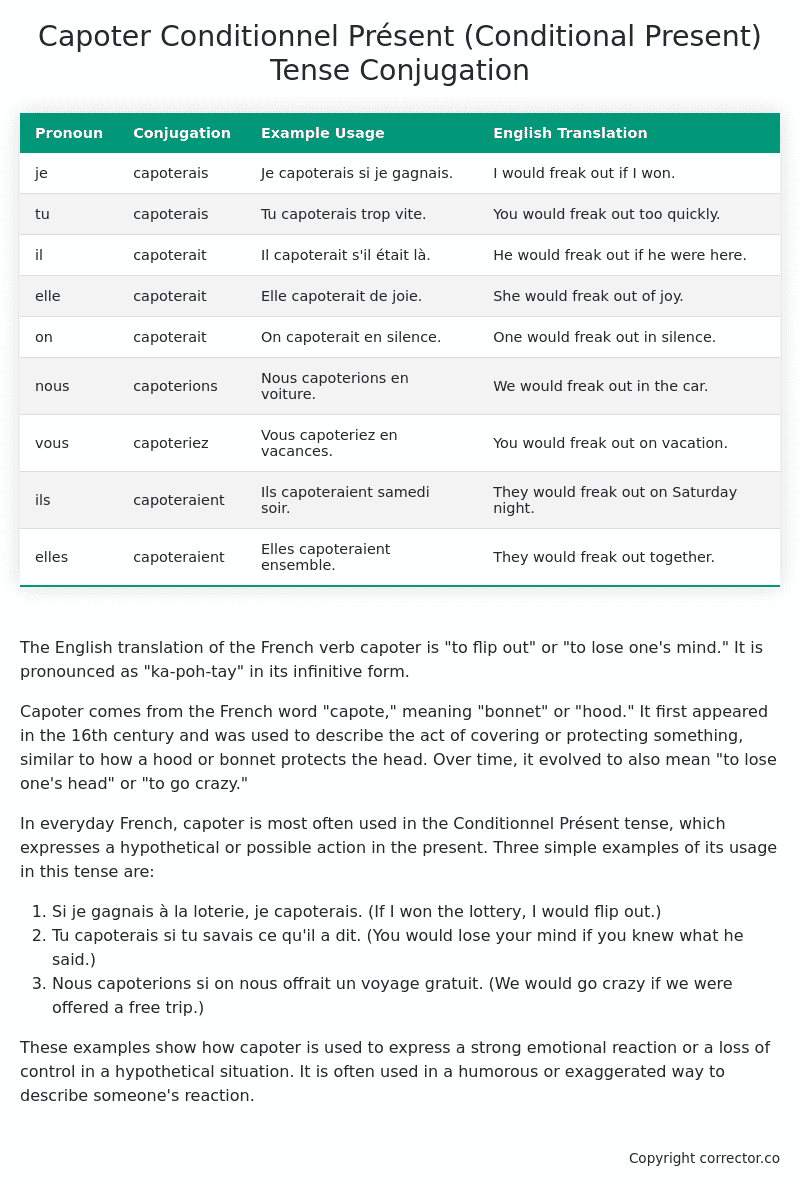Conditionnel Présent (Conditional Present) Tense Conjugation of the French Verb capoter
Introduction to the verb capoter
The English translation of the French verb capoter is “to flip out” or “to lose one’s mind.” It is pronounced as “ka-poh-tay” in its infinitive form.
Capoter comes from the French word “capote,” meaning “bonnet” or “hood.” It first appeared in the 16th century and was used to describe the act of covering or protecting something, similar to how a hood or bonnet protects the head. Over time, it evolved to also mean “to lose one’s head” or “to go crazy.”
In everyday French, capoter is most often used in the Conditionnel Présent tense, which expresses a hypothetical or possible action in the present. Three simple examples of its usage in this tense are:
- Si je gagnais à la loterie, je capoterais. (If I won the lottery, I would flip out.)
- Tu capoterais si tu savais ce qu’il a dit. (You would lose your mind if you knew what he said.)
- Nous capoterions si on nous offrait un voyage gratuit. (We would go crazy if we were offered a free trip.)
These examples show how capoter is used to express a strong emotional reaction or a loss of control in a hypothetical situation. It is often used in a humorous or exaggerated way to describe someone’s reaction.
Table of the Conditionnel Présent (Conditional Present) Tense Conjugation of capoter
| Pronoun | Conjugation | Example Usage | English Translation |
|---|---|---|---|
| je | capoterais | Je capoterais si je gagnais. | I would freak out if I won. |
| tu | capoterais | Tu capoterais trop vite. | You would freak out too quickly. |
| il | capoterait | Il capoterait s’il était là. | He would freak out if he were here. |
| elle | capoterait | Elle capoterait de joie. | She would freak out of joy. |
| on | capoterait | On capoterait en silence. | One would freak out in silence. |
| nous | capoterions | Nous capoterions en voiture. | We would freak out in the car. |
| vous | capoteriez | Vous capoteriez en vacances. | You would freak out on vacation. |
| ils | capoteraient | Ils capoteraient samedi soir. | They would freak out on Saturday night. |
| elles | capoteraient | Elles capoteraient ensemble. | They would freak out together. |
Other Conjugations for Capoter.
Le Present (Present Tense) Conjugation of the French Verb capoter
Imparfait (Imperfect) Tense Conjugation of the French Verb capoter
Passé Simple (Simple Past) Tense Conjugation of the French Verb capoter
Passé Composé (Present Perfect) Tense Conjugation of the French Verb capoter
Futur Simple (Simple Future) Tense Conjugation of the French Verb capoter
Futur Proche (Near Future) Tense Conjugation of the French Verb capoter
Plus-que-parfait (Pluperfect) Tense Conjugation of the French Verb capoter
Passé Antérieur (Past Anterior) Tense Conjugation of the French Verb capoter
Futur Antérieur (Future Anterior) Tense Conjugation of the French Verb capoter
Subjonctif Présent (Subjunctive Present) Tense Conjugation of the French Verb capoter
Subjonctif Passé (Subjunctive Past) Tense Conjugation of the French Verb capoter
Subjonctif Imparfait (Subjunctive Imperfect) Tense Conjugation of the French Verb capoter
Subjonctif Plus-que-parfait (Subjunctive Pluperfect) Tense Conjugation of the French Verb capoter
Conditionnel Présent (Conditional Present) Tense Conjugation of the French Verb capoter (this article)
Conditionnel Passé (Conditional Past) Tense Conjugation of the French Verb capoter
L’impératif Présent (Imperative Present) Tense Conjugation of the French Verb capoter
L’infinitif Présent (Infinitive Present) Tense Conjugation of the French Verb capoter
Struggling with French verbs or the language in general? Why not use our free French Grammar Checker – no registration required!
Get a FREE Download Study Sheet of this Conjugation 🔥
Simply right click the image below, click “save image” and get your free reference for the capoter Conditionnel Présent tense conjugation!

Capoter – About the French Conditionnel Présent (Conditional Present) Tense
Formation
Common Everyday Usage Patterns
Expressing Polite Requests
Expressing Hypothetical Situations
Expressing Doubt or Uncertainty
Interactions with Other Tenses
Present Tense
Past Tense
Future Tense
Conditional Perfect
Summary
Want More?
I hope you enjoyed this article on the verb capoter. Still in a learning mood? Check out another TOTALLY random French verb conjugation!


